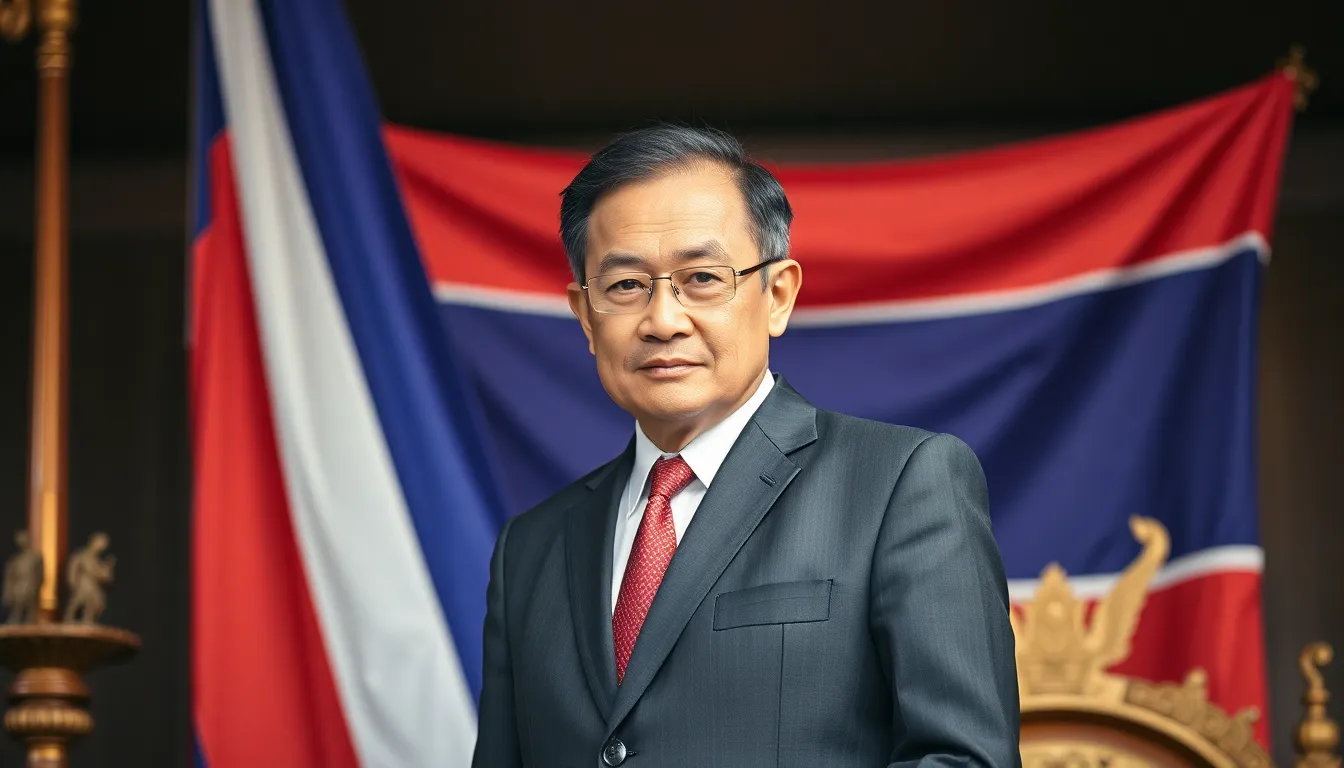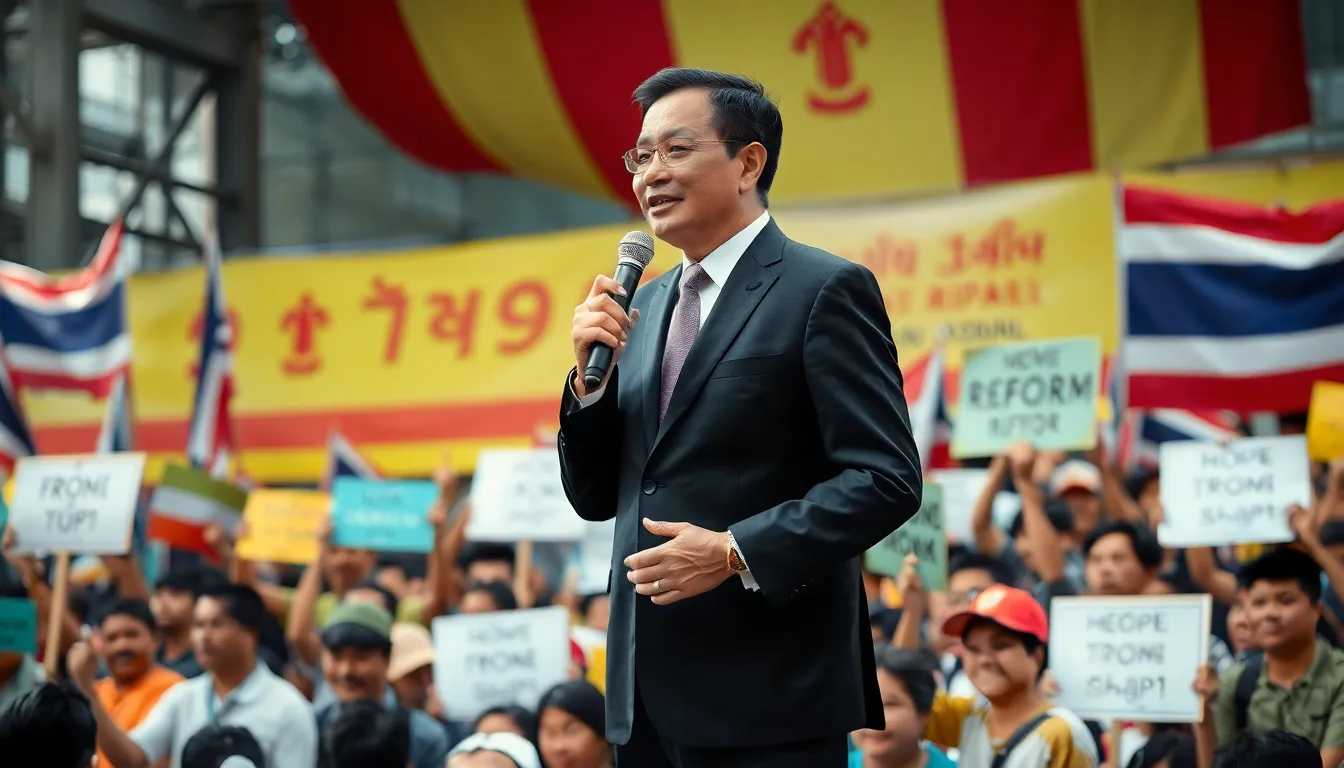Table of Contents
ToggleAs the political landscape in Thailand continues to evolve, the spotlight shines brightly on the current Prime Minister of 2025. With a mix of charm and determination, this leader navigates the complexities of governance while balancing the hopes and dreams of a diverse nation. It’s a thrilling time for Thailand, as the Prime Minister tackles challenges that would make even the most seasoned politicians break a sweat.
Overview of Thailand’s Political Landscape
Thailand’s political landscape evolves rapidly, marked by intense competition among parties and leaders. The current prime minister faces numerous challenges, including economic recovery, social issues, and regional stability. Political parties often engage in coalition-building, reflecting the diverse interests of Thailand’s population.
In recent years, public discontent with traditional politics has grown, resulting in a rise of new political movements. Voter participation remains crucial, with recent elections showcasing shifts in public support. Economic policies and social reforms dominate the discourse, as citizens demand transparency and accountability in governance.
The influence of the military on politics persists, shaping electoral outcomes and governmental structures. Instances of protests in urban areas reveal the public’s desire for reform and change. Many parties now emphasize youth engagement and digital platforms to connect with younger voters.
Thailand’s monarchy plays a significant role in political affairs, contributing to the complexity of governance. Cultural factors also influence political decisions, as leaders navigate traditional expectations alongside modern demands for democracy.
International relations, particularly with neighboring countries and global powers, affect political strategies and economic priorities. Foreign investment and trade agreements often drive discussions in the legislative arena.
Overall, the political climate in Thailand remains dynamic and multifaceted, requiring adept leadership to address the aspirations of its diverse citizenry. In this context, the prime minister’s ability to manage competing interests shapes the nation’s future.
Profile of the Current Prime Minister of Thailand 2025

The current Prime Minister of Thailand embodies leadership amid complex challenges. This profile highlights key aspects of their journey.
Early Life and Education
Born in Thailand, the Prime Minister grew up in a middle-class family that valued education. Early curiosity and ambition drove them to excel academically. They pursued a degree in political science from a prestigious university, emphasizing governance and public administration. Later, advanced studies abroad exposed them to international politics and economic frameworks. These experiences laid a strong foundation for their future political endeavors, enhancing their understanding of both domestic and global issues.
Political Career and Achievements
The political career of the Prime Minister initiated with grassroots involvement, addressing local community needs. Early leadership roles in local government showcased their commitment to public service. A significant breakthrough occurred when they joined a major political party, swiftly rising through the ranks. Notable achievements include initiating economic reforms that stimulated growth and investing in educational programs aimed at youth. They also championed environmental policies to address climate change impacts. Through coalition-building, the Prime Minister managed to unite diverse political factions, ensuring stability in governance during turbulent times.
Key Policies and Initiatives
The Prime Minister of Thailand in 2025 focuses on several key policies to address pressing issues. These initiatives aim to align with the aspirations of the populace while promoting growth and stability.
Economic Reforms
Economic reforms stand at the forefront of the Prime Minister’s agenda. Strategies prioritize boosting investment in infrastructure projects, which enhances connectivity and drives growth. Tax incentives for small and medium enterprises encourage entrepreneurship, fostering innovation across various sectors. Increased funding for digital economy initiatives promotes technological advancement, aiming to position Thailand as a regional leader in tech. This approach strengthens the overall economy, addressing post-pandemic recovery gaps and enhancing global competitiveness. Fostering public-private partnerships showcases a commitment to sustainable economic practices.
Social Policies
Social policies reflect the Prime Minister’s commitment to inclusivity and welfare. Enhancing access to quality education ensures that all citizens can benefit from learning opportunities. Healthcare initiatives focus on expanding universal coverage, catering to underprivileged communities. Fresh approaches to housing programs aim to provide affordable living options, particularly for young families. Recognizing the significance of environmental sustainability, policies support renewable energy projects to combat climate change. Collaborative efforts with local organizations emphasize community engagement, empowering citizens and fostering social cohesion. Overall, these policies strive to create a balanced and equitable society for all Thai citizens.
Public Reception and Criticism
Public reception of the current Prime Minister reflects a mix of admiration and skepticism among the population. Many citizens appreciate the leader’s approach to governance and efforts to address pressing issues faced by Thailand.
Supporters’ Perspectives
Supporters highlight the Prime Minister’s commitment to economic reforms, citing increased investments in infrastructure and initiatives for small businesses. They express confidence in policies aimed at improving healthcare access, noting expanded universal coverage. Advocates also value the focus on educational improvements and renewable energy projects, believing these steps create a more sustainable future. Engagement with younger voters through digital platforms resonates positively among those who support the administration. Enthusiastic responses from grassroots movements indicate a sense of hope for inclusive governance.
Opposition Views
Critics voice concerns over transparency and accountability, questioning the effectiveness of proposed reforms. Detractors argue that the Prime Minister’s administration fails to adequately address public discontent and widespread distrust in political institutions. Some also express skepticism about the coalition-building approach, fearing it may lead to compromises that undermine core democratic principles. Protests reflect growing frustration, especially among youth, who demand effective change rather than incremental improvements. Overall, opposition voices stress the necessity for more substantial reforms to regain public trust.
Future Challenges and Prospects
Navigating Thailand’s political landscape presents numerous challenges for the Prime Minister in 2025. Economic recovery ranks high among priorities as the nation faces post-pandemic hurdles. Addressing social issues is equally critical; the Prime Minister must find solutions to rising public discontent and calls for reforms.
Coalition-building remains essential for governance stability. Political alliances will be tested amid increasing competition among parties. Engaging with younger voters through digital platforms offers one way to strengthen connections and draw support. Protests in urban areas highlight the urgency for substantial reforms, reflecting citizens’ desire for change.
The influence of the military in Thai politics continues to shape strategic decisions. Maintaining a balance between traditional political influences and modern democratic expectations is crucial. Positive international relations stand as another pillar for success, as foreign investments and trade agreements are vital for Thailand’s economic future.
Polls indicate mixed public reception; supporters of the Prime Minister highlight economic and educational reforms. Critics, however, emphasize concerns about transparency and accountability. Striking a balance between implementing reforms and adhering to democratic principles will prove challenging.
Focusing on environmental sustainability aligns with global priorities and enhances Thailand’s reputation. Renewable energy initiatives may pave the way for a greener economy while satisfying citizens’ aspirations. Effective communication of these priorities can bridge gaps in public trust and foster a collaborative spirit.
The Prime Minister faces a multifaceted and dynamic environment that requires adept leadership and innovative solutions. Balancing diverse interests while addressing emerging challenges will set the foundation for a stable and prosperous Thailand.
The current Prime Minister of Thailand in 2025 navigates a complex political landscape filled with both challenges and opportunities. As the nation strives for economic recovery and social reform, the Prime Minister’s ability to unite diverse factions and engage younger voters will be crucial.
With a keen focus on transparency and accountability, there’s a pressing need for effective communication to build public trust. The balance between traditional influences and modern democratic expectations will shape the future of governance.
As Thailand continues to evolve, the Prime Minister’s leadership will play a pivotal role in steering the country toward a stable and prosperous future, addressing the aspirations of its citizens while fostering sustainable development.




